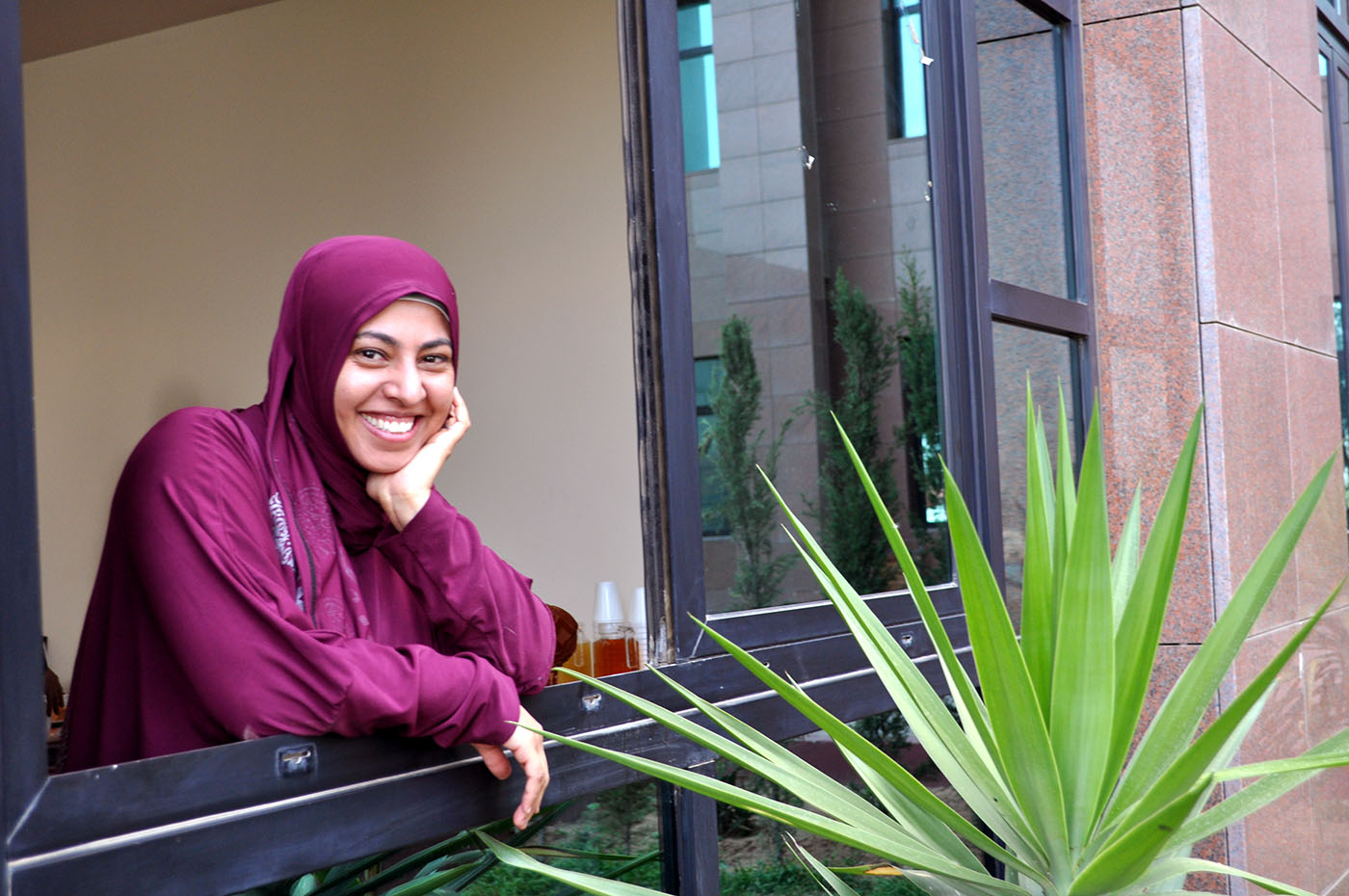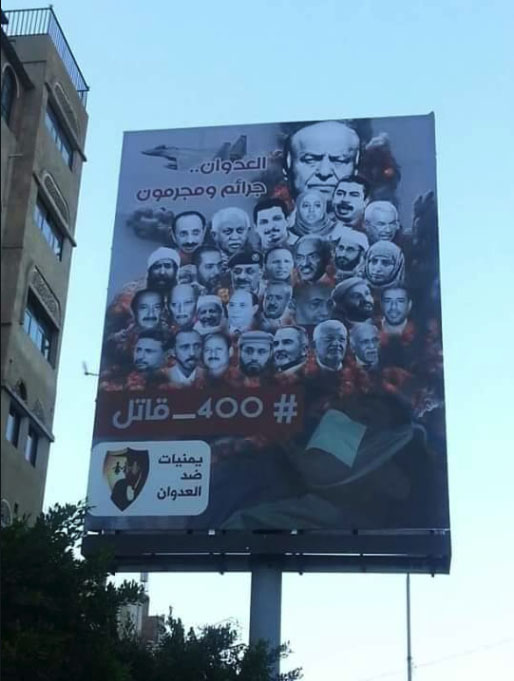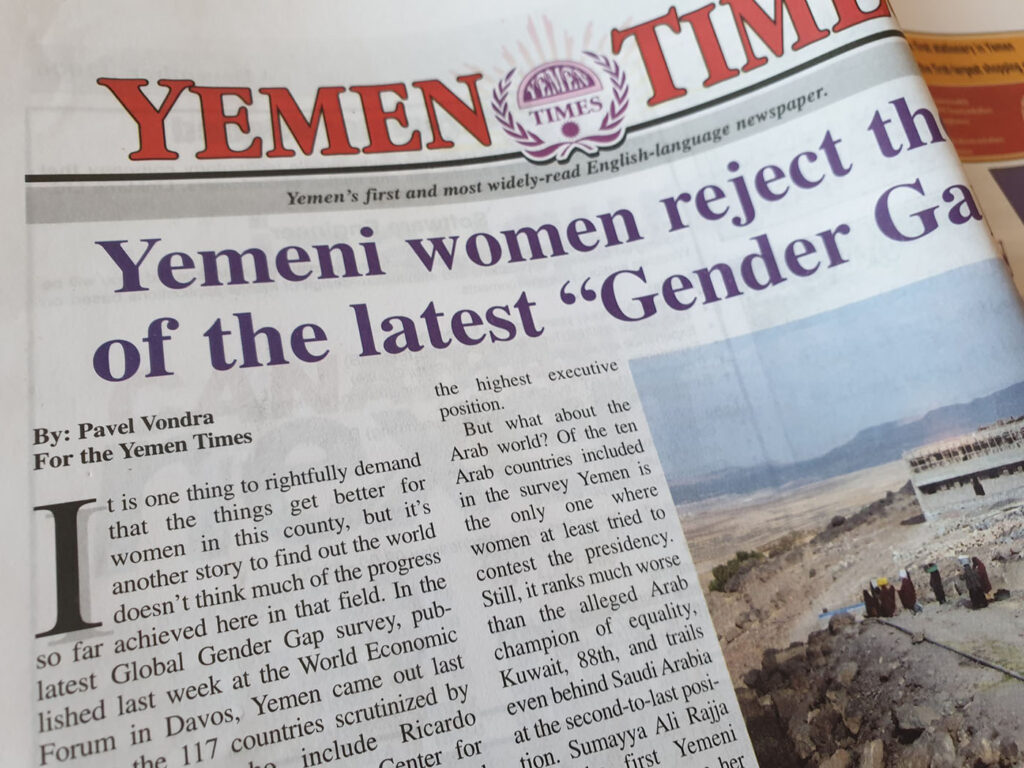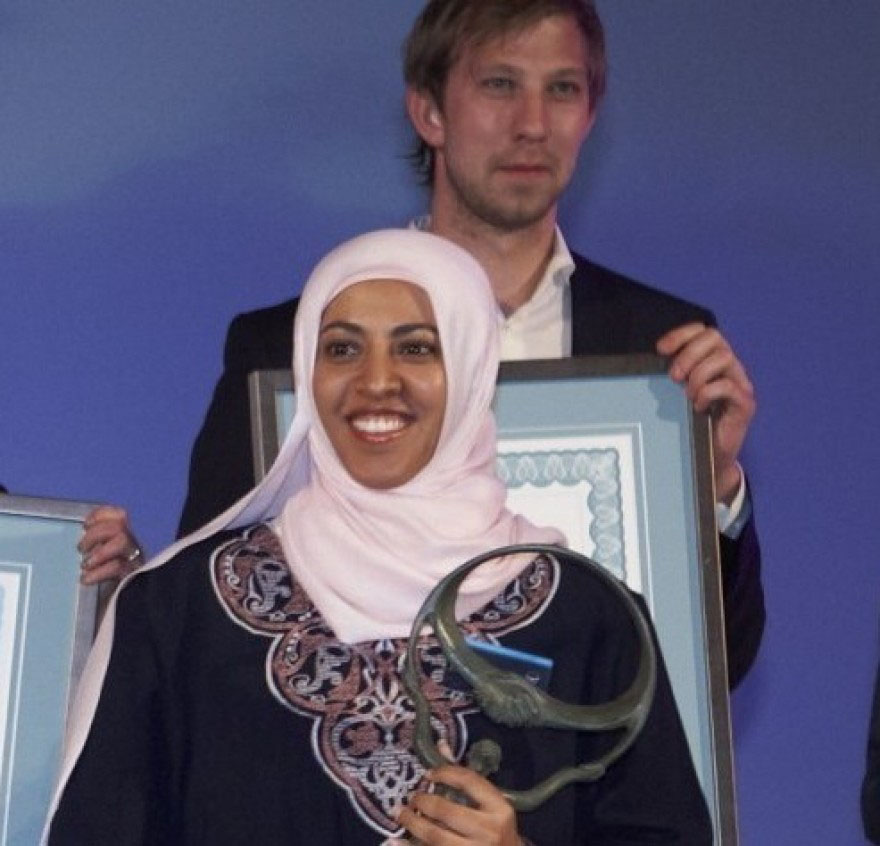
Nadia Al-Sakkaf served as editor in chief at the Yemen Times from 2005 until 2014, before becoming Yemen’s first female Minister of Information. She fled Yemen in 2015 after the coup and is currently an independent researcher in politics, media, development and gender studies based in the United Kingdom. In 2011, Al-Sakkaf gave a popular TED talk called “See Yemen through my eyes” which had over three million views.
Nadia Al-Sakkaf
Seeing my name on the list of traitors sentenced to death in absentia by the Houthi rebels had a strange, almost surreal, effect on me. It was if I were reading about a fictional character, not a real person, and definitely not about me.
It wasn’t that I cared for the Houthis’ mockery of the justice system, or that I was worried for my life now that I was living in the UK. It was more sadness at how harsh life in Yemen had become.

First there were the direct threats and intimidation while I was in the country because of my role as Minister of Information. When I managed to flee with my two children from the Houthi militia, they raided my home and took everything. Then they put up my photo among others in the streets of Sana’a, branding us as traitors. They launched a campaign against me on social media and in the mainstream media they control. They even created playing cards with names of so-called traitors, giving me the five of hearts, printed along with a curse and defamation.
Being the first in anything is not always a good thing and is almost never easy. At the age of 26, I was the first woman to run a national independent media outlet, the Yemen Times. I used my position to become the first Yemeni woman to give a TED talk, in which I told the world a bit about my country. In 2014, I was the first woman to become Minister of Information in Yemen. Prior to that, I was among very few women, if not the only one, serving on several high level political committees, working towards a national dialogue and peace in the country, following the 2011 uprising. And now, because of my political activism in Yemen, especially in response to the Houthi militia’s actions, I am the first woman whom the Houthis have sentenced to death for political reasons.
Since the Houthis’ coup in 2014, the situation for Yemeni women has become more dangerous than ever. I dread to think what would have happened to me had I not managed to escape. We keep hearing news of Yemeni women detained and even tortured in Houthi prisons, not least the story of 21-year-old Intisar Al-Hammadi, who is being held under inhumane conditions.
Reinventing oneself is one of the hardest challenges a person can face. Yet it is an exciting opportunity. This has happened to me twice so far in my professional career of 25 years. Once by choice, as a young information systems’ analyst in 2003, and then by force, at the height of my professional career in politics in 2015.
Growing up as a Yemeni girl, I had choices and privileges that very few of my peers had. Yemen is a very hard country for women. It is even said that it is the worst place in the world to be a woman. But I was shielded from this reality because I was born into a modern-minded family, with my father being a pioneer, a person ahead of his time. Professor Abdulaziz Al-Saqqaf was a self-made man, one who struggled to advance in life. He worked three jobs while being a university student, a husband and a father. His ambition led him to Harvard, Tufts and the Sorbonne, where he earned several degrees before returning to Yemen and leading a risky life as a professor of economics at Sana’a University, and more significantly, founder and editor of Yemen’s first English language newspaper, the Yemen Times, in 1990.
My siblings and I looked up to him, and to our mother who also completed a university degree in English while raising four little children, and who pursued a career in education. Education was the key word in our family — that and hard work. My dad used to say “hard work never hurts,” before launching us on a new assignment. From a young age, I wanted to write in Arabic, competing in and even winning regional creative writing contests. Later, I turned to English for my journalistic and research work, due to the turn of events in my career. I saw the power of media unfold before my eyes through the Yemen Times, and I wanted to try my hand at it. However, my parents thought that since I was an A-level student, I had better invest in a “more secure career,” as they put it. Through a scholarship, I found myself in India, where I studied at one of the most prestigious engineering universities, working my way through a degree in computer science engineering.
On the fateful morning of June 2, 1999, I was enjoying a summer vacation in Yemen with my family when the news struck. My father had been assassinated because of his activism in human rights. This tragedy impacted not only our family but the entire country, as he was considered a national figure. My older brother took over the newspaper, and I returned to India to complete my degree, living with a broken heart.
The following year, a few months after I graduated from university, my mother died; she’d had a heart condition for years, but the doctor said the trauma of losing her husband in a brutal way had taken its toll and she couldn’t survive. I suppose I was not yet ready to live in Yemen, so I traveled on a Chevening scholarship to the UK to do my master’s degree in Information Systems Management. I returned to Yemen a year later and worked for a year as a systems analyst, before I realized I was in the wrong discipline. That’s when I threw everything away and started from scratch, working in development with the Oxfam-GB program in Yemen and embarking on a career as a journalist with the Yemen Times.

In March 2005, I was appointed by the board to head the newspaper. I became the first woman to run a national periodical in Yemen. That first year as editor in chief of a prestigious periodical, in a male-dominated industry in a conservative country, was very hard. Not only had I started a new challenging job, but I was also recently married. The balance between work and home is a myth. If it weren’t for my supportive husband, I would not have succeeded in leading the newspaper, overhauling it and winning two international prizes by the end of 2006, the Gibran Tueni Award and the Free Media Pioneers Award.
In retrospect, the Gebran Tueni Award was instrumental in boosting my morale and giving me strength to carry on in those early years of my editor’s career. When I received the call informing me that I had been awarded the prize, it was a December evening in 2006. I was working on my laptop when my little daughter Aya, who was around six months old at the time, crawled up to me and began tugging on my leg, asking for attention. That was a heart-wrenching moment for me as a mother. I looked at her and asked myself, what am I doing? Why am I working at this hour, trying to prove myself and improve media in Yemen, while my little one is asking for my undivided attention?
I stopped my work and picked her up. That is when my phone rang. It was the Gebran Tueni Award committee, saying that I had won the first Tueni award ever. I hadn’t been aware that I was nominated. They said that a prestigious committee of well-known journalists and editors were aware of my work and decided to bestow the award on me. That was when I found the answer to my question. I was doing all this because it matters, because I was making a difference.
This message came to me again and again, especially in times of despair. The 2013 Oslo Business for Peace Award, and the 2015 World Economic Forum’s Young Global Leaders Award also came when I was struggling.
Needless to say, the constant element in my life is my husband and my brothers and sister, who have always had my back and made life easier for me. And now I also find hope in my children: my daughter Aya, to whom I dedicated an article in 2011; and my son Omar, who has never known Yemen, as he had to flee when he was barely two years old.
As a woman media leader in Yemen, I had to fight multiple battles, one in the media institution (even though I was the editor, I was continuously challenged and sometimes ridiculed), another in the wider industry, and yet another with the authoritarian regime, which men and women working in civil society were beginning to confront. In my first weeks as the chief editor of the Yemen Times, the editorial department was comprised of only male mid-to-late-career journalists. Acts of defiance started manifesting themselves, especially when I required them to use computers instead of writing their stories by hand, and demanded that they adhere to a professional standard of work, including citing sources and fact-checking. Because I didn’t have a journalism degree, I had to study hard and take courses to understand the fundamentals of journalism. It came easy to me because of my love for words. Also, my engineering background came in handy because it helped me formulate logical arguments, especially in statistical and numerical information. In the first year, I had to fire half of the staff and overhaul the newsroom. I hired young ambitious women and men and created a young, technically enabled and gender-balanced newsroom. It wasn’t an easy task, but a woman’s got to do what a woman’s got to do.

Most Yemeni women leaders, of whom there are unfortunately very few, also have a personal battle at home with their own families, especially when the latter disapprove of their public engagement. I found inspiration in the stories of women such as Hooria Mashhour, who was a role model for me. One by one, I fought and triumphed in each of my battles, leaving my mark on the media scene in the country.
The uprising of 2011 especially was a trial by fire. We were inspired by the Arab Spring in Tunisia and Egypt, and our youth wanted to change the regime of President Ali Abdullah Saleh, which had ruled for three decades. The Yemen Times played a major role in informing the world about what was going in Yemen, particularly the events of 2011, during which we created a record of Yemen’s Arab Spring. When Saleh surrendered power to his deputy Abdrabbuh Mansur Hadi in a historic moment through the Gulf Cooperation Council Initiative, we rejoiced, thinking that Yemen was saved from the civil war that would become the fate of Syria and Libya. Little did we know that we had just delayed the inevitable for a few years.
I was quite active on the political scene by then, taking part in several high-level committees as part of a UN-led plan to foster a national dialogue and eventually propel Yemen into a new democratic and inclusive era. I was quite vocal about Yemen and the future it deserved. At the time, I was optimistic — optimism infused my 2011 TED talk, as I invited the world to see Yemen through my eyes. In 2012, I launched the first community radio in Yemen, Radio Yemen Times in Sana’a, and followed that in 2014 with Radio Lana in Aden. Also in 2014, I was appointed as the first woman Minister of Information in my country.
Again, I faced the patriarchal environment, only this time on a larger scale. Previously, I had hoped that the higher a woman rises, the easier it would be for her to assert her authority. I was wrong. In fact, the higher we climb on the ladder of power, the more resistance we face, because we are perceived as a major threat to the patriarchy.
As if my having to face this challenge was not enough, the country at the time was on the verge of a full-fledged armed conflict. Saleh had been working behind the scenes, aligned himself with the Houthis, a politico-religious minority, and fomented a coup d’état against the state, including the government of which I was a member.
The Information Ministry and various state media institutions were raided, and I found men with Kalashnikovs in my office. Along with other government officials, I became a target. In 2014 and 2015, I bore witness to the crumbling of the state and used every tool at my disposal to inform Yemenis and the world about what was going on.
The Houthis used a good cop/bad cop strategy with me, as they hoped to win me over, but when I would not yield they started targeting me. At one point, I found myself confined to my home, using my personal Twitter account to tell the story of Yemen. Eventually, I had to flee the country in disguise with my two little children in early April 2015, leaving everything behind.
It’s been seven years since I had to reinvent myself for the second time. I came to the UK on a scholarship to do my PhD in Political Science. These days, not many people know my history, and if they discover that I was once a minister, they are surprised. Now I work as a researcher and consultant, and have expanded my areas of expertise beyond media, gender and politics. I explore economic development, climate change and even digital safety. But while I am safe with my family, my country continues to burn, and like many other members of the diaspora, I suffer from survivor’s guilt. My goal now is to continue informing the world about Yemen, but also to support knowledge-sharing and empowerment of citizens anywhere under the sun.


What a brave and inspirational saga!
I hope and pray for healing and recovery of our beloved country.
Nadia will remain one of the greatest female leaders in Yemen’s history. I worked with her in Yemen Times and she has indeed made a positive change in the media landscape.